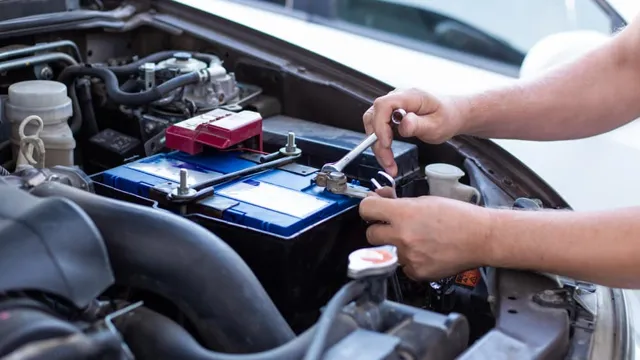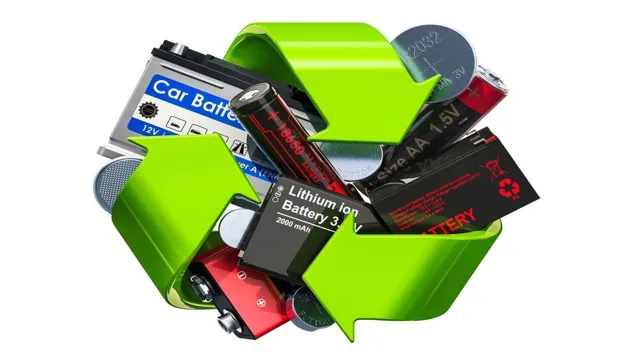Do Electric Cars Require Battery Replacement? The Truth Behind the Lifespan of Electric Vehicle Batteries
Electric cars have been gaining popularity over the years, and it’s no surprise why. They’re environmentally friendly, cost-effective, and efficient. However, one of the most important aspects of electric cars is the battery that powers them.
The battery technology is constantly evolving to become more advanced and improve the performance of electric cars. But what exactly makes up an electric car battery, and how does it work? In this article, we’ll dive into the world of electric car batteries to help you understand its importance and how it’s shaping the future of transportation.
Battery Lifespan
One of the worries that people often have regarding electric cars is the battery lifespan, and whether they need to replace the batteries at any point. The answer varies depending on the specific car and battery, but in general, electric car batteries can last for many years and miles before needing to be replaced. This is because electric car batteries are designed to have a longer lifespan than traditional car batteries, and many manufacturers offer warranties for the battery that last for several years.
Additionally, electric car batteries can often be recharged and reused multiple times, meaning that they do not need to be replaced as frequently. So, if you’re thinking about getting an electric car, you can rest assured that you won’t need to replace the battery anytime soon!
How long do electric car batteries last?
Electric car batteries have come a long way and have become an increasingly popular option for those looking for an eco-friendlier form of transportation. However, one question that often arises is just how long do electric car batteries last? The answer largely depends on a variety of factors, including the brand, type, and usage of the battery. On average, most electric car batteries are expected to last for around 100,000 miles.
However, some manufacturers offer warranties of up to 8 years or 100,000 miles. It’s important to note that battery lifespan can also vary based on how the car is driven and charged. For example, aggressive driving and frequently charging the battery to 100% can lead to a shorter lifespan, while gentler driving practices and keeping the battery charge level between 20% and 80% can help prolong the battery’s lifespan.
Just like any other battery, electric car batteries will gradually lose their capacity and won’t be able to hold as much charge as they once did, but with proper care and maintenance, they can still offer reliable performance for years to come.

What factors affect battery life?
Battery lifespan can be affected by several factors. One of the most significant factors is the number of charging and discharging cycles that the battery undergoes. Typically, lithium-ion batteries have a limited number of cycles they can go through before they start losing their capacity.
Repeated exposure to high temperatures, such as leaving your device in the sun or a hot car, can also contribute to a shorter lifespan. Similarly, exposing the battery to extreme cold can cause it to lose its charge quickly. The age of the battery also plays a role, as older batteries may not hold a charge for as long as they once did.
Finally, the amount of use the battery gets can impact its lifespan, as batteries that are used heavily will degrade faster than those that are used less frequently. By taking proper care of your battery and avoiding these factors as much as possible, you can maximize its lifespan and ensure that your device remains usable for longer.
Battery Replacement
One common question people have when it comes to electric cars is whether or not they need to replace the batteries. The short answer is yes, eventually. However, the battery life of electric cars is typically around 8-10 years or 100,000 miles, so it’s not something that needs to be done frequently.
Additionally, many electric car manufacturers offer warranties on the batteries for a certain number of years or miles, so you may not have to pay for a replacement if anything goes wrong. It’s important to keep up with regular maintenance and make sure you properly charge your electric car to prolong the life of the batteries. Overall, while battery replacement may be necessary down the line, it’s not something you need to worry about too much in the near future.
Do you need to replace electric car batteries?
As electric cars become more popular, one question that often arises is whether or not the batteries need to be replaced over time. The short answer is yes, eventually. Like any other battery, electric car batteries have a limited lifespan and will eventually need to be replaced.
However, the good news is that this typically doesn’t happen until after several years of regular use. And with modern advances in battery technology, replacement costs are decreasing. In fact, most electric car manufacturers offer warranties on their batteries for a certain number of years or miles, so you may not have to worry about battery replacement costs for a while.
Of course, like any other part of a car, proper maintenance can help extend the life of your electric car battery. This includes not letting it fully discharge too often, keeping it at a moderate temperature, and avoiding extreme heat or cold. Overall, while electric car batteries will eventually need to be replaced, it’s not something you need to stress about on a regular basis.
When should you consider replacing them?
Battery replacement is something that should be considered when your device battery starts to show signs of deterioration. Typically, batteries have a lifespan of around 2-3 years, during which they can be recharged consistently without any significant issues. However, as they age, you may notice that the battery life starts to decline, and it may not hold a charge for as long as it used to.
This can be frustrating, especially if you rely on your device for work or other important tasks. In these cases, it may be time to consider replacing the battery. Another sign that you may need to replace your battery is if it starts to bulge or swell.
This can happen when the battery is overcharged or exposed to high temperatures, and it can be dangerous if not addressed promptly. If you notice any of these symptoms, it’s recommended that you take your device to a professional to have the battery replaced as soon as possible to prevent any further damage or safety issues. By replacing your battery, you can extend the life of your device and ensure that it remains functional for years to come.
What is the cost of battery replacement?
Battery replacement cost can vary depending on a few different factors. Firstly, the type of battery you need to replace will play a significant role in the overall cost. Lithium-ion battery replacements are often more expensive than lead-acid batteries, for example.
Additionally, the size of the battery needed for your device will affect the price. Larger batteries will cost more to replace than smaller ones. Finally, the age of the device and the number of cycles the battery has gone through will also impact the cost of replacement.
Overall, it’s difficult to give an exact figure for battery replacement cost without knowing more about the device in question. However, it’s worth noting that in some cases, it may be more cost-effective to replace the entire device rather than just the battery. So, it’s important to consult with a professional or do your research before deciding on the best course of action.
Maintenance Tips
One of the advantages of owning an electric car is that you don’t have to replace the car’s batteries as frequently as you would for a gasoline-powered vehicle. While gasoline cars require oil changes, air filter replacements, and other maintenance tasks, electric cars have far fewer moving parts, thus causing less wear and tear. The batteries in an electric car can last up to 15 years or more before needing replacement.
However, battery replacement can be expensive, with prices ranging from $3,000 to $15,000, so it’s crucial to take good care of your car’s battery to extend its lifespan. One way to do this is to avoid leaving your car at full charge for extended periods, as it can speed up the aging of the battery. Additionally, it’s essential to keep your car’s battery cool, as high temperatures can also cause battery degradation.
By following these tips, you can ensure that your electric car’s battery will serve you well for many miles to come.
How to extend the life of your electric car battery?
Extending the life of your electric car battery is important for maximizing your investment and reducing emissions. The good news is that maintaining your battery is relatively easy. To get the most out of your EV battery, it’s essential to keep it charged between 20% and 80%.
Draining the battery to 0% and not letting it reach full charge can shorten its lifespan. It’s also important to keep your battery cool, avoiding excessive heat or extreme cold temperatures. Regularly checking the battery’s coolant levels and keeping the battery clean can help with temperature control.
Additionally, avoiding driving at high speeds and accelerating rapidly can help lessen the battery’s workload and extend its life. By following these simple maintenance tips, you can enjoy a long and healthy life for your electric car battery.
What regular maintenance does your electric car battery require?
Regular maintenance is important to keep your electric car battery running smoothly and efficiently. One of the most important things you can do is to monitor the battery’s state of charge regularly. Charging your battery too much or too little can reduce its overall lifespan and lead to decreased performance.
You should also clean and inspect the battery terminals on a regular basis to ensure that they are free of corrosion and contamination. Additionally, it’s recommended that you replace your battery coolant every few years to help maintain optimal operating temperatures and prevent overheating. Finally, it’s important to store your electric car with a somewhat charged battery if you plan to leave it unused for an extended period of time.
By following these simple maintenance tips, you can help extend the life of your electric car battery and enjoy a smoother, more efficient driving experience.
Conclusion
In conclusion, while electric cars do indeed use batteries, the need for replacement is dependent on a variety of factors such as usage, maintenance, and technology advancements. However, just like your favorite toy or electronic device, sometimes the batteries just need a little TLC or replacement to keep the fun going. So, if the time comes and your electric car needs a battery replacement, take solace in the fact that you’re taking a step towards a greener future where the only thing draining is your car’s battery life and not your wallet on gas.
FAQs
Do electric cars use traditional batteries?
No, electric cars use rechargeable lithium-ion batteries that do not need to be replaced as frequently as traditional batteries.
How often do electric car batteries need to be replaced?
Electric car batteries typically last for around 8-10 years before needing to be replaced. However, with proper maintenance and care, they can last longer.
Can electric car batteries be recycled?
Yes, electric car batteries can be recycled to recover valuable metals such as lithium, cobalt, and nickel. This reduces the environmental impact of the batteries and helps conserve natural resources.
Are electric car batteries expensive to replace?
Yes, electric car batteries can be expensive to replace. However, prices are steadily decreasing as technology improves and more manufacturers enter the market. Some manufacturers also offer warranty coverage for battery replacements.





